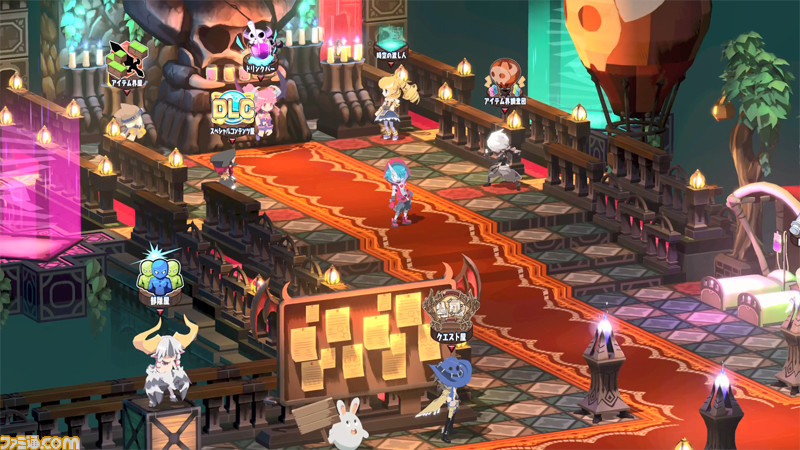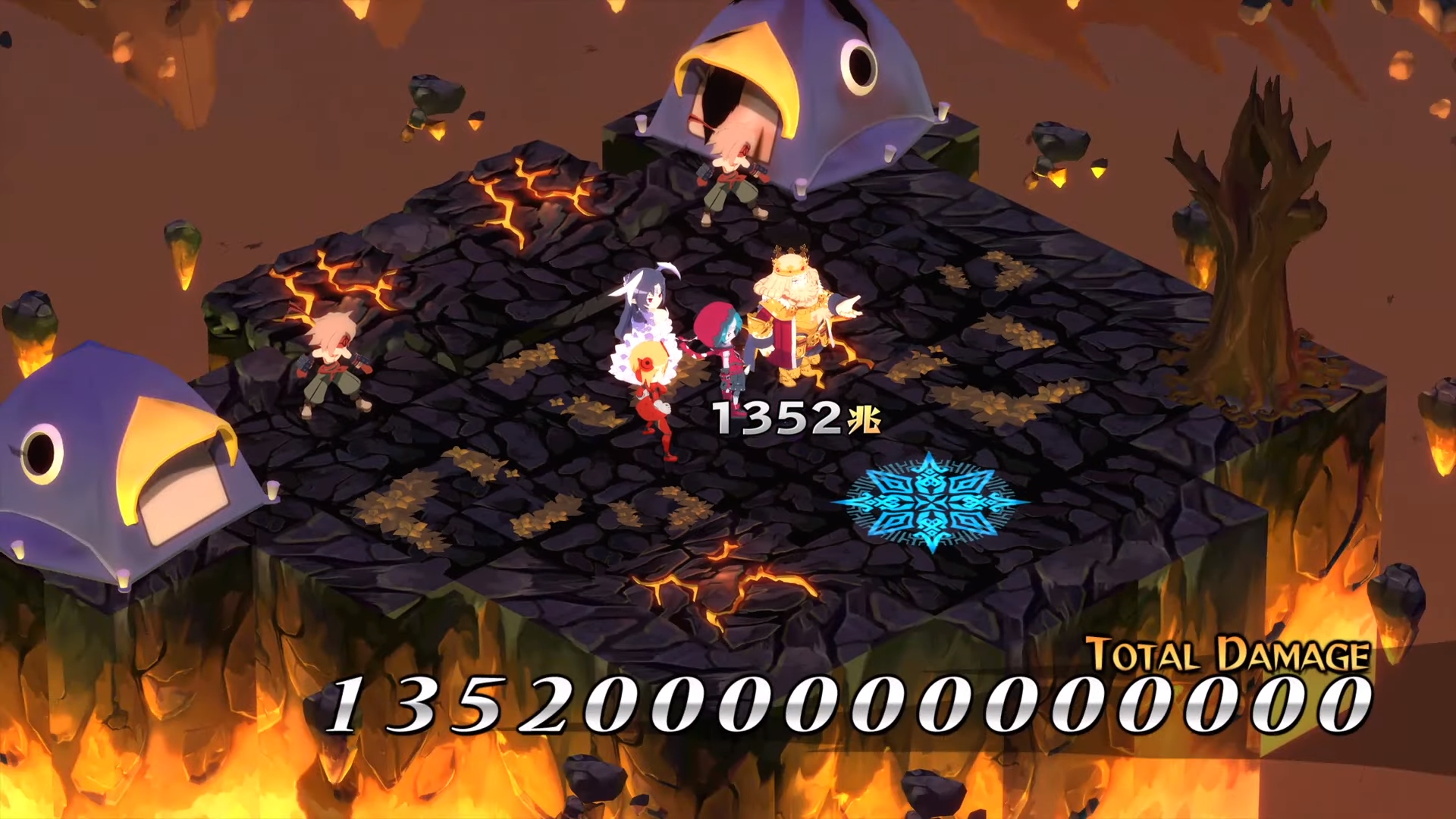Search
[{{{type}}}] {{{reason}}}
{{/data.error.root_cause}}{{{_source.title}}} {{#_source.showPrice}} {{{_source.displayPrice}}} {{/_source.showPrice}}
{{#_source.showLink}} {{/_source.showLink}} {{#_source.showDate}}{{{_source.displayDate}}}
{{/_source.showDate}}{{{_source.description}}}
{{#_source.additionalInfo}}{{#_source.additionalFields}} {{#title}} {{{label}}}: {{{title}}} {{/title}} {{/_source.additionalFields}}
{{/_source.additionalInfo}}- Details
- Category: Switch
- By Daniel Cullen
- Hits: 2435
Disgaea 6: Defiance of Destiny (Switch)

Disgaea 6: Defiance of Destiny
Developed By: Nippon Ichi Software
Published By: NIS America
Released: June 29, 2021
Available On: Nintendo Switch, PlayStation 4 (Japan only)
Genre: Role-Playing, Strategy
ESRB Rating: Teen (Suggestive Themes, Alcohol Reference, Fantasy Violence, Language, Mild Blood, In-Game Purchases)
Number of Players: Singleplayer
Price: $59.99
(Amazon Affiliate Link)
I'd like to thank NIS America for the review key to this title.
Sometimes, old series have to try new things to avoid going stale, yet must avoid making too many changes to avoid breaking what does not need fixing. Disgaea 6: Defiance of Destiny tries to aim for the former without leaning into the latter. While it succeeds at making many good new changes, some things it didn't change it should have.
Disgaea 6 is split into two Acts. The first act revolves around protagonist Zed and his quest to stop the "God of Destruction" (a generic title, its true name if any is unknown), a mysterious being with a mindless lust for chaos and destruction. The second act reveals the truth of its origins and why it came to be the scourge of the setting.
Now, I'm not going to go much further to avoid spoilers, but this is one area where the creators got a bit lazy. Lots of Disgaea 5 writing was reused, and while the story has some interesting innovations, it's easy to see where the plot recycled a lot of Disgaea 5's character development and plot devices. The "God of Destruction" is a scary boss the first time around, but it becomes such a common sight that you will come to despise having to see it. Unlike other Disgaea titles, over 80% of the boss battles are you having to fight some variation of it over and over again, which gets old very fast.
The gameplay is like every other Disgaea game in being an isometric, top-down RPG. Like all the previous games, it's turn-based, features character classes, learnable skills, recruitable party members, and all the other mainstays of the RPG genre filtered through the satirical lens of the Disgaea-verse, which is laden with all sorts of self-aware mockery of RPGs and even itself at times.
Unlike prior titles, many of the more tedious aspects were streamlined. Monster-specific weapons were removed, as everyone can use standard weapons limited only by their innate skill level. Features to streamline the Dark Assembly (for unlocking new gameplay features like dungeons and bonuses, now with less guesswork for how to get the senators to agree to help you) and the Hospital (as you now heal between levels, making the Hospital more of a prize dispenser for taking certain levels of damage throughout the game) make gameplay simpler. There are now features to automate gameplay, so you can just repeat levels with automated character actions to simplify level grinding. Finally, the level cap was raised from 9,999 to a whopping 99,999,999, so for obsessive Disgaea fans who want to see if you can reach such an insane number, you'll have a new goal to strive for and foes of appropriate strength to match.

Strong Points: Many complex aspects of earlier games were simplified; good first attempt at full 3D models
Weak Points: Recycled story elements from Disgaea 5; poor performance of framerate at certain settings
Moral Warnings: Violence primarily in self-defense; one scene with a mild display of blood; virtually every PG-13 level profanity used at one point or another like a**, s**t, and b***h; some very revealing female outfits and a few crude jokes about breasts; profound display of magic, demons, and occult powers; some references to crude humor concerning assaults to the privates (albeit pointed out as in bad taste in-universe)
Graphically, Disgaea 6 retains the earlier anime-style art of the previous titles, though this time all characters are rendered as 3D models, not as high-resolution sprites. It's clear this is a first attempt for the Disgaea franchise at this, and the models do look pretty good if a bit stiff at times. It's clear for performance reasons not all the battle animations are rendered as models, but the animation work is a bit toned down from the ridiculously over-animated sprites of the earlier titles in the series. It still looks good too. However, even with this sanity check measure the framerate and graphical question go hand in hand.
The game has Quality, Balanced, and Performance settings. Balanced is a good mix of the two that, except for very rare intervals, was at a stable 30 FPS. The Quality setting looks the best but the framerate drops into the 10s down to PowerPoint Presentation level frames. The Performance option runs very well, but looks like a muddy Nintendo DS game in terms of quality, with lots of visible aliasing. I had to play in Balanced over the other two because it was neither too blurry nor too slow.
The music and sounds are all classic Disgaea fare, with anime vocals, synth rock, and the series trademark whipsaw of hilarious themes and dramatic soundtracks for the tense moments. The game has English and Japanese vocal options, and both sound great. If you have the freely downloadable DLC (other DLC costs money), it's obvious they replaced the voice actor of Disgaea 2's Adell with a sound-alike, but all the others currently available sound just like you'd expect from the earlier games.
Controls, since I played on a handheld Switch, were generally well done, with the keys mapped to logical and easy-to-reach controller buttons and movement to the left analog stick and D-pad. If you need to navigate a lot of menus, you can cramp your hands after a while, but that's my only complaint. Otherwise, I found it simple to play the game. Some of the menus do require switching between different buttons like the shoulder buttons and even the right analog stick, which can take a bit to adjust to, but that's the only learning curve complaint.
As mentioned above, stability and the setting of the graphical quality are tied at the hip, and outside of that, I only encountered one strange bug where the AI glitched out for controlling one of my characters, which I was unable to replicate and retrying the level flushed the issue.
Morally, as Disgaea is based on a fantasy kitchen sink with a satirical take on angels, demons, and everything in between, this game has some definite issues.

Higher is better
(10/10 is perfect)
Game Score - 80%
Gameplay - 14/20
Graphics - 7/10
Sound - -10/10
Stability - 5/5
Controls - 4/5
Morality Score - 48%
Violence - 5/10
Language - 4/10
Sexual Content - 6.5/10
Occult/Supernatural - 0/10
Cultural/Moral/Ethical - 8.5/10 (+9 points for consistent moral lessons on the folly of selfishness, showing the evil of defiling the supernatural which Man has no business with and the consequences, and promoting unselfish love for relatives and family figures)
Violence is of the give orders and watching it happen RPG variety, with no display of blood and gore during combat, and the combat itself has a very cartoony look, despite the fact some attacks look quite lethal. Bodies vanish immediately after defeat as well. There is a cutscene where someone is brutally devoured by a dragon, but aside from the woman in question's ribbon and bits of blood (though it looks like it could be red cloth fragments, hard to tell) are shown falling from the mouth of the dragon, they keep it from being too gruesome. Otherwise, violence isn't too horrifying.
Language is pretty crass. Virtually every curse word in the PG-13 level wheelhouse gets used at one point or another, such as a**, b***h, and s***. There are a few crude jokes about the size of certain female characters' breasts (a running gag from the earlier games), and a joke or two about getting hit in the privates, though the latter is not considered a good thing. One character even admonishes the incivility of another for hitting an enemy in the "b-hole", since the said character was setting a bad example for children.
Aside from several female characters with an absurd amount of exposed cleavage (though otherwise remain suitably covered), the game stays out of the deviance gutter. There is also a kissing scene, that, while romantic, stays clean looking and is played for comedy.
Being a Disgaea game, the occult and supernatural are part and parcel of the whole experience. For starters, your protagonist Zed is a zombie, most characters not explicitly identified as human are some form of demon, necromancy and most other forms of magic are commonplace, and so on. Granted, this is a setting where God (as established in Disgaea 1 and 4) is real, the salvation of souls works on a Catholic-styled premise, and God is regarded with a fair amount of respect throughout.
Morally and ethically, the main playable cast is all focused on stopping a being of great destruction that is attempting to destroy all the planes of reality in the setting, and while the story has mentions of unethical behavior they do outside of player control, the player is never forced or even encouraged to do so in all playable segments. In fact, given the game has a prevalent theme about the evils of selfish motives and how there can be no redemption for those who do not forsake such motives, ethics are a recurring positive element.
Another good moral is that despite the fact you can play as a zombie (and they are recruitable generic characters), it's mentioned the main villain tried to purposely circumvent the natural order that Man (humans in particular) were appointed once to die, was denied official help from God on this, and so their evil ways were in part lashing out at God for not catering to their selfishness. It is made explicit they defiled things they had no business meddling with and they are made to pay a heavy price for doing so.
A final positive of the game is a pronounced amount of emphasis on the love of family, whether by blood or otherwise. The redemptive root of many characters renouncing their sins and faults is unalloyed, unselfish love for those to whom they are related or serve as family figures, and the game subtitle is a reference to this. Fate itself is allowed to be bent for a righteous purpose at one point by the playable cast because of the selfless desire of those who loved others without expecting anything in return except the chance to redeem a life that would otherwise be forever lost.
All that said this game is a mix of good and bad, especially for the sixth mainline game of the franchise. The streamlining of the gameplay and art change to 3D models is good. The performance issues and the incredibly recycled plot largely cribbed from Disgaea 5 are not so great. Morally, the frequent language and pronounced occult/supernatural influences are two big, undeniable moral stains among several other things. On the plus side, it does have good morals about the evils of selfishness, why turning to evil ways out of spite has dire moral consequences and a pronounced theme of the redemptive love for family. For Disgaea fans, get this on sale if you can, but if you can ignore the shortcomings, the core fun of the Disgaea games is still here.






